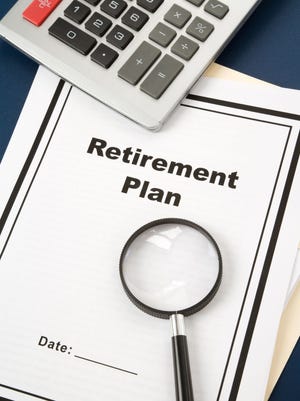Frugal retirees ditch 4% rule, hoard savings instead

Retirees may be overly pessimistic about their future financial health and that may lead them to spend less than they could otherwise, according to a new study by United Income, a startup that aims to apply big-data analysis to financial planning.
The average adult 60 years or older will trim their spending by about 2.5 percent every year, or by about 20 percent over a 10-year period, according to United Income's analysis.
Meanwhile, retirees leave behind a similar amount of wealth regardless of what age they die. For example, the average retired adult who dies in their 60s leaves behind $296,000 in net wealth, $313,000 in their 70s, $315,000 in their 80s, and $238,000 in their 90s, researchers found.
The bottom line: "Retirees are not enjoying their retirement as much as they could," said Matt Fellowes, founder and CEO of United Income and former chief innovation officer at investment research company Morningstar.
United Income analyzed two sets of data for its study: The University of Michigan Health and Retirement Study based on interviews of roughly 20,000 people for more than 20 years and the University of Michigan's monthly survey of consumer sentiment.
Pessimism abounds
Older Americans have become steadily more pessimistic about their own future economic prospects, the study found. The gap in optimism between people younger than age 35 and Americans age 65 and older has increased by 3 percent for every year added to the life expectancy of the average adult.
While the study shows that rising pessimism among older Americans is correlated to lower consumption, it does not show that negative sentiment is actually causing the decline in spending in retirement.
However, the research echoes what many previous studies have shown, that people tend to hold on to money in their investment accounts as long as they can, said Geoff Sanzenbacher, an economist at Boston College's Center for Retirement Research.
For example, only 18 percent of households with members age 60 and older make withdrawals from their retirement accounts in a typical year, according to a 2011 National Bureau of Economic Research study conducted by Dartmouth, Harvard and MIT economists.
Returns vs. withdrawals
When retirees did take money out, the average withdrawal was about 2 percent of assets. That means that the average annual rate of return on account balances often exceeded the withdrawal rate.
Retirement account withdrawals did rise sharply after age 70½, according to the NBER study, with annual withdrawals of about five percent per year. At that age, people have to make required minimum distributions from retirement accounts each year or face a 50 percent tax penalty.
Many financial advisors and investors tout a simple strategy when it comes to withdrawing from retirement accounts: the 4 percent rule.
Under the rule, you withdraw 4 percent each year from a diversified portfolio of stocks and bonds, adjust annually for inflation, and you will have enough to last for 30 years in retirement based on historical returns of the U.S. stock market. Yet based on the research by United Income and others, it doesn't seem many investors are actually following the rubric.
So if retirees are living frugally, does this mean that they have saved enough for retirement? "People can still make their money last in retirement and not have saved enough for retirement," said Sanzenbacher, who is studying how people draw down assets from their retirement accounts.
More uncertainty
While current retirees may have the financial cushion not to outlive their savings, people headed into retirement may not be so fortunate.
About 13 percent of current retired private-sector workers have a traditional pension plan that pays guaranteed benefits for life, according to the Employee Benefit Research Institute. That figure has dropped from 20 percent of retired private-sector workers who had traditional pension plans in 2000.
The rise of 401(k) plans and similar workplace retirement plans where people have to manage their investments themselves or with the help of financial advisors has created more uncertainty for retirees, said Teresa Ghilarducci, an economics professor at the New School for Social Research and a longtime critic of 401(k) plans.
Baby Boomers headed into retirement now will not have the same type of guaranteed benefits many current retirees enjoy, Ghilarducci said. And that could mean that they are more likely to burn through their savings.
"Retirees are hoarding money because they feel uncertain about their future in this do-it-yourself system," she said.
More from Your Money Your Future:
Use this IRA strategy if you think tax reform will happen by next year
Six common myths that can really mess up your retirement
The best coast? Top 10 cities for an active retirement
© CNBC is a USA TODAY content partner offering financial news and commentary. Its content is produced independently of USA TODAY.